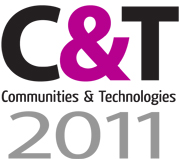1st International UBI Summer School 2010
May 31 – June 4, 2010, Oulu, Finland
http://www.ubioulu.fi/en/UBI-summer-school-2010
The purpose of the summer school is to provide young researchers with an opportunity to gain deeper insight to the multidisciplinary fields of ubiquitous and urban computing, to stimulate international R&D networking and to promote the UBI-challenge.
The summer school comprises of six parallel workshops:
A: Real World Context-Aware Systems
by Professor Anind Dey, Carnegie Mellon University, USA
B: Urban Informatics and Sustainable Cities
by Associate Professor Marcus Foth, Queensland University of Technology, Australia
C: Urban Social Networks Analysis
by Professor Vassilis Kostakos, University of Madeira, Portugal
D: Creating and Sharing Artistic Experiences with Ubiquitous Technology
by Jürgen Scheible, Aalto University, Finland
E: IP-based Wireless Sensor Networks
by CTO Zach Shelby, Sensinode, Finland
F: Interactive Textures – rethinking materiality
by Professor Mikael Wiberg, Umeå University, Sweden
How to apply:
The number of students accepted for each workshop is limited. Therefore, prospective young researchers should email by Apr 19, 2010 to Professor Timo Ojala (timo.ojala [at] ee.oulu.fi) a one page statement (PDF), which contains your contact information, a brief description of your research interests in ubiquitous and/or urban computing, a brief desciprtion of your motivation to attend the summer school, and a ranked list of the workshop(s) you would be interested in attending. If you are accepted to the summer school, then you will work in one particular workshop for the whole week. For example, if you wish to first attend workshop E but in case it would not be available you would also consider attending workshop B, then please state “my preferred workshops: E B” in your statement.
Best regards,
Professor Timo Ojala
University of Oulu
Finland
timo.ojala [at] ee.oulu.fi
Please also note:
2nd Open Ubiquitous City Seminar
May 31, 2010, Oulu, Finland
http://www.ubioulu.fi/en/2nd-Open-Ubiquitous-City-Seminar
http://www.facebook.com/event.php?eid=358147083927
Start Time: Monday, 31 May 2010 at 09:00
End Time: Friday, 04 June 2010 at 17:00
Street: Erkki Koiso-Kanttilan katu 3
City: Oulu, Finland


